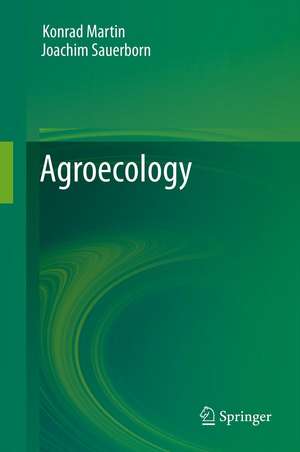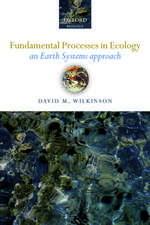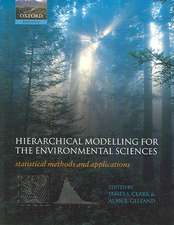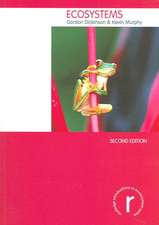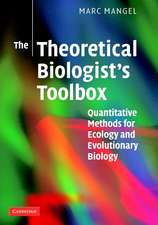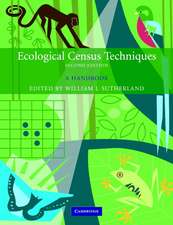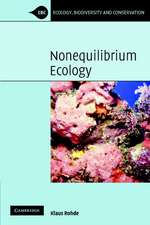Agroecology
Autor Konrad Martin, Joachim Sauerbornen Limba Engleză Paperback – 8 feb 2015
| Toate formatele și edițiile | Preț | Express |
|---|---|---|
| Paperback (1) | 861.93 lei 38-44 zile | |
| SPRINGER NETHERLANDS – 8 feb 2015 | 861.93 lei 38-44 zile | |
| Hardback (1) | 931.15 lei 38-44 zile | |
| SPRINGER NETHERLANDS – 21 mar 2013 | 931.15 lei 38-44 zile |
Preț: 861.93 lei
Preț vechi: 1134.13 lei
-24% Nou
Puncte Express: 1293
Preț estimativ în valută:
164.93€ • 172.66$ • 136.47£
164.93€ • 172.66$ • 136.47£
Carte tipărită la comandă
Livrare economică 02-08 aprilie
Preluare comenzi: 021 569.72.76
Specificații
ISBN-13: 9789400796003
ISBN-10: 9400796005
Pagini: 340
Ilustrații: X, 330 p.
Dimensiuni: 155 x 235 x 18 mm
Greutate: 5.15 kg
Ediția:2013
Editura: SPRINGER NETHERLANDS
Colecția Springer
Locul publicării:Dordrecht, Netherlands
ISBN-10: 9400796005
Pagini: 340
Ilustrații: X, 330 p.
Dimensiuni: 155 x 235 x 18 mm
Greutate: 5.15 kg
Ediția:2013
Editura: SPRINGER NETHERLANDS
Colecția Springer
Locul publicării:Dordrecht, Netherlands
Public țintă
Upper undergraduateCuprins
1. Introduction.- 2. Origin and development of agriculture.- 3. Patterns and processes in ecosystems.- 4. Crops and their environment.- 5. Management of unwanted organisms.- 6. Production and management of livestock resources.- 7. Climate zones and land use.- 8. Agroecological aspects of global change.
Recenzii
From the reviews:
“Martin and Sauerborn … use a broad approach to reach a wide spectrum of readers. The book has been translated very well from the original German. The examples and concepts of agroecology presented are universal. … This has the potential to be the book that introduces new student cohorts in both biology and agriculture to the other’s point of view and to begin a new, productive conversation to the benefit of both. Summing Up: Highly recommended. Upper-division undergraduates and above.” (M. J. Stone, Choice, Vol. 51 (4), December, 2013)
“Martin and Sauerborn … use a broad approach to reach a wide spectrum of readers. The book has been translated very well from the original German. The examples and concepts of agroecology presented are universal. … This has the potential to be the book that introduces new student cohorts in both biology and agriculture to the other’s point of view and to begin a new, productive conversation to the benefit of both. Summing Up: Highly recommended. Upper-division undergraduates and above.” (M. J. Stone, Choice, Vol. 51 (4), December, 2013)
Notă biografică
Konrad Martin is biologist and agroecologist at the University of Hohenheim, Germany.
His specific interests are animal-plant interactions and community ecology. He was involved in various international research projects in countries of Southeast Asia and conducted studies on biological pest control and food webs in agroecosystems, on insect diversity cultivated tropical landscapes, and on the effects of land use change on species interactions.
Joachim Sauerborn studied agricultural sciences at the universities Giessen and Hohenheim, Germany. He conducted studies on weed ecology and agroecology in tropical and subtropical regions and spent a research period at the International Center for Agricultural Research in the Dry Areas in Aleppo, Syria. As a professor for agroecology at the University of Hohenheim, his main research is on land resources management in tropical regions. He has published several books and over 70 articles in refereed journals.
His specific interests are animal-plant interactions and community ecology. He was involved in various international research projects in countries of Southeast Asia and conducted studies on biological pest control and food webs in agroecosystems, on insect diversity cultivated tropical landscapes, and on the effects of land use change on species interactions.
Joachim Sauerborn studied agricultural sciences at the universities Giessen and Hohenheim, Germany. He conducted studies on weed ecology and agroecology in tropical and subtropical regions and spent a research period at the International Center for Agricultural Research in the Dry Areas in Aleppo, Syria. As a professor for agroecology at the University of Hohenheim, his main research is on land resources management in tropical regions. He has published several books and over 70 articles in refereed journals.
Textul de pe ultima copertă
This book represents an interdisciplinary approach to the relevant aspects of agricultural production related to the interactions between natural processes, human activities and the environment. It provides condensed and comprehensive knowledge on the functions of various agroecosystems at the field, landscape and global scale. Understanding and integrating complex ecological processes into field production, land management and food systems is essential in order to deal with the challenges of modern crop and livestock production. These are characterized by the need for food security for the growing human population on the one hand, and the necessity to combat the detrimental effects of food production on the environment on the other.
The book provides the scientific basis required by students and scientists involved in the theoretical and practical development of sustainable agroecosystems and contributes to a range of disciplines including Agriculture, Biology, Geography, Landscape Ecology, Organic Farming, Biological Control, and Global Change Ecology.
Specific chapters include: the beginnings and progress of agriculture; abiotic processes and species interactions in agroecosystems; ecology of agricultural soils, weeds, pests and diseases; management and control options; livestock production systems, agroecosystems of the different ecozones of the world; environmental problems including land degradation and effects of land use on biodiversity and ecological cycles; global aspects related to the future of human food production, global climate change and the increasing world population.
The book provides the scientific basis required by students and scientists involved in the theoretical and practical development of sustainable agroecosystems and contributes to a range of disciplines including Agriculture, Biology, Geography, Landscape Ecology, Organic Farming, Biological Control, and Global Change Ecology.
Specific chapters include: the beginnings and progress of agriculture; abiotic processes and species interactions in agroecosystems; ecology of agricultural soils, weeds, pests and diseases; management and control options; livestock production systems, agroecosystems of the different ecozones of the world; environmental problems including land degradation and effects of land use on biodiversity and ecological cycles; global aspects related to the future of human food production, global climate change and the increasing world population.
Caracteristici
A condensed, interdisciplinary and up to date knowledge of all relevant processes related to agroecology Topics and aspects designed to understand and to integrate complex interactions More than 200 illustrations and quick overview sections for easy reference Includes supplementary material: sn.pub/extras
